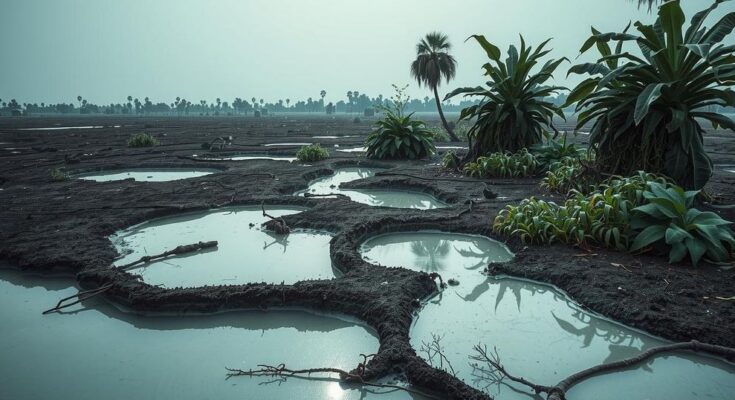The conflict in Ethiopia’s Oromia region has led to a stark rise in malaria deaths, significantly disrupting healthcare services. The WHO reported over 7 million cases in 2023 alone, with conflict and climate change compounding the crisis. Doctors plead for urgent action as families, like that of Lema Tefera, face devastating losses due to inadequate healthcare and resources.
Lema Tefera recounted a harrowing tale of loss, describing how four of his children succumbed to malaria within a month as a consequence of the ongoing conflict in Ethiopia’s Oromia region. He lamented, “There was no malaria medication and treatment in our village due to the fighting,” emphasizing the critical healthcare disruption worsened by violence.
Malaria continues to be a severe threat in Africa, which records approximately 95 percent of the 250 million cases and over 600,000 malaria-related deaths globally each year, according to the World Health Organization (WHO). Experts caution that the crisis in Oromia, marked by conflict between government forces and the Oromo Liberation Army (OLA) since 2018, is intensifying, dramatically affecting healthcare services in the region.
Reports indicate a sharp increase in malaria fatalities in Ethiopia, with the country recording 7.3 million cases and 1,157 deaths from January to October 2023, as reported by the WHO. These figures have alarmingly doubled from the previous year, and Oromia accounts for nearly half of the national cases and fatalities, further stressing an already crumbling healthcare infrastructure.
Healthcare professionals observe a surge in malaria cases, which is being exacerbated by a combination of armed conflict and climate change. For subsistence farmers, like Lema, this situation has been particularly catastrophic. He remarked, “It was the worst situation I have ever experienced,” illustrating the dire personal impact of the crisis.
Malaria accounted for an unprecedented 70 percent of patients treated at Nejo General Hospital, illustrating the stark rise compared to just 20 percent in previous years. Meanwhile, climate change has facilitated the mosquito population and prolonged transmission seasons, leading to higher mortality rates, as noted by experts.
Doctors Without Borders (MSF) announced that 2024 is shaping up to record the highest number of malaria cases ever encountered in Ethiopia, exacerbated by the longstanding conflict and increasing temperatures fueling the disease spread. Rachelle Seguin, a medical coordinator with MSF, stated, “I think it’s a little bit the perfect storm…”
Moreover, a recent freeze of U.S. aid funding, initiated under President Donald Trump, threatens to exacerbate the situation by cutting off crucial resources for malaria control and other communicable diseases. Doctor Nuredin Luke highlighted the detrimental effects this funding cut could have on public health, emphasizing the urgency for reinstatement of support.
For Lema, who now relies on family support to survive, the grief of losing four children weighs heavily on him. He expressed, “I have been completely depressed; I have not been able to recover from the grief,” underscoring the profound emotional toll of the ongoing humanitarian crisis.
Overall, the confluence of conflict, healthcare collapse, and climate change in Oromia is creating an alarming epidemic of malaria, endangering countless lives and necessitating urgent intervention to prevent further tragedy.
The ongoing conflict in Ethiopia’s Oromia region has led to a devastating rise in malaria deaths, with healthcare disruptions exacerbated by climate change. The situation has worsened dramatically, recording millions of cases and thousands of fatalities, leaving many families in despair. Without immediate intervention and restoration of aid, the humanitarian disaster is set to deepen further, demanding urgent global attention and action.
Original Source: newscentral.africa




